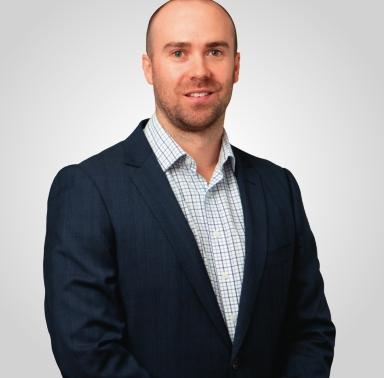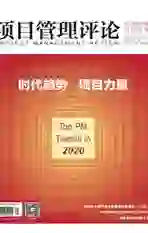项目管理中没有“我”
2020-03-02尉艳娟
尉艳娟

編者按
项目经理的角色定位是什么?VUCA时代,项目经理如何开展变更管理?如何对待风险?如何与相关方有效沟通?如何向上管理?人工智能将为项目经理这一职位带来怎样的影响?带着以上问题,我们采访了2019年IPMA“年度青年项目经理奖”和2018年澳大利亚项目管理协会(AIPM) “未来项目领导者奖”得主——帕特里克·莱希(Patrick Leahy)。
帕特里克·莱希是一名客户方项目管理专业人员,从业十余年,拥有出色的沟通能力,能够在严格的时间限制内有效地管理多项任务。让我们一起倾听来自一线优秀项目经理的心路历程和经验分享。
Interview
The Enjoyable Part of PM Lies in Challenges
You have been in this field for over ten years; what are the enjoyable and challenging parts of being a project manager
Patrick Leahy: The things I enjoy the most are quite often things that challenge me the most.
Diversity of issues. Construction projects will always leave you saying, “I havent seen that one before”. Whether it be developing a design solution to a complex engineering requirement, tailoring a procurement activity to strict rules or uncovering unexpected finds on-site, you never know what tomorrow will bring. I find the challenge of developing a process for dealing with an unconventional issue and managing the process to a successful outcome to be very rewarding.
People. As a project manager, you deal with many people with a diverse range of experience and backgrounds. You become privy to a huge amount of information; however, you need to tailor your communication and engagement approach to every individual to ensure that you get the best result for your project.
Project Manager Is a Facilitator
How will you describe the work of a project manager to a newcomer
Patrick Leahy: Ive always struggled with this question. I remember trying to explain my new job as a client-side project manager to my grandfather, who was a lifetime electrician. Every time I explained my role, he would always respond with “so what do you actually do ”
The title ‘Project Manager is incredibly broad and it will mean different things to different people. I like to describe the role of a project manager as being a facilitator. Primarily you are responsible for identifying what needs to be done, who are the best people to complete each task and then you make sure everything gets done. Sure, there will be countless intricacies along the way; however, it generally comes back to those three main aspects. As a project manager, you must always challenge yourself to add value to every step of the process.
Communication Style Is What Most Characterizes a Project Manager
Have you observed some differences between male and female project managers
Patrick Leahy: I dont believe so. Project management is a skillset which is not gender-based, but primarily personality-based. Every individual project manager will have a different approach. As our profession is heavily reliant on engagement, the way you communicate with stakeholders is what most characterizes a project manager.
Since communication is so important, in your opinion, what are the secrets of successful communication
Patrick Leahy: Always be upfront and transparent. As a project manager, you will be dealing with people of various professions and areas of expertise. No matter what type of projects you are dealing with, you can be assured that your audience will likely be an educated one. People can see ulterior motives from a mile away.
If you come to a meeting table with a hidden agenda or try to sneak decisions through unnoticed, you will be found out. Once you lose the trust of your colleagues, the project team or worse, your client, it is very hard to regain that trust.
Theres No ‘I in Project Success
In your opinion, what are the top qualities that enable you to win the IPMA “Young Project Manager of the Year” Award
Patrick Leahy: Having success as a project manager is not an independent accomplishment. I have had a lot of support from the company I work for, the project team as well as the client team that I have worked with.
I believe the most important thing for a young project manager is to be open to challenges. See every step as an opportunity not only to learn, but also to think creatively. Dont wait and listen to other peoples thoughts or opinions or be told what to do first, but challenge yourself to develop your own approach and then consult others.
There was an element of luck for me to get an opportunity to work on such a complex and one-of-akind construction and engineering project at an early stage of my career. Some people will go their whole career without such an opportunity. My advice to young project managers is that once you do get an opportunity to work on a unique project that you enjoy, dont take it for granted. Dive headlong into the project and give it your all. Seeing something through from start to finish can be a career-building move.
Its said that you are good at collaborative management style; would you please explain it
Patrick Leahy: One of my favourite sporting sayings is that there is no ‘I in ‘team. The same holds true for project success.
There is no reason for a project manager to dominate or overcontrol situations or meetings. A well-run project is one that has the right people in the room at the right time. A project managers role is to ensure that information is available to all parties and that all opinions are explored during the process.
When working with an internal team of varying levels of experience, it is equally important to listen to everybodys ideas and approach. Ideas from people of different generations or backgrounds will inevitably lead to innovation, which our industry badly needs.
Never Lose Momentum
Would you please offer some tips on change management and stakeholder management based on your experience
Patrick Leahy: My advice on change management is to never lose momentum. There are thousands of ways to deal with change management and there is certainly no one-size-fits-all approach. Once you find the right approach, do not take your foot off the peddle. Keep your engagement with the team up. If you end up with a stop / start approach, you will find yourself covering the same ground again.
Stakeholder management is a key responsibility of a project manager. Establishing an appropriate governance structure should be your first task and it is not a set-and-forget item. Ensuring that there is ongoing buy-in from all stakeholders will go a long way to you achieving your project goals.
You need to form relationships with your stakeholders. You dont necessarily need to be friends with everyone; however, relationships build trust and trust is critical. Relationships also allow you to find out what drives individuals. For example, asking simple questions may allow you to learn that a member of your design team might be a single parent and having early morning meetings could have a large impact on their life outside of work. It is also important to develop relationships with key stakeholders and to ensure these relationships are maintained even when encountering difficult decisions or differences of opinions.
Bad News Never Gets Better with Age
In VUCA era, how do you view risk management Do you have some experience to share
Patrick Leahy: VUCA (Volatility, Uncertainty, Complexity and Ambiguity) sounds like a normal Monday morning in the construction industry.
I have seen teams create risk registers at the start of a project and never refer to them again. Issues will continually develop and evolve. If you as a project manager are not alert to them, they will become risks.
A piece of advice one of my bosses gave me is that‘bad news never gets better with age. Everybody is human and projects operate in the real world. Mistakes will happen and things will change. When you discover an issue, question it, investigate it, report it and solve it. Dont leave it for another day because it will only grow.
Managing upward Is Necessary
The significance of managing upward is increasingly important. How do you manage up in practice
Patrick Leahy: Some projects will view sponsor groups as so far up the food chain that they dont have time for your project and they have more important things to do. Whether this is the case or not, we as project managers must ensure that all relevant stakeholders influence the project. My current project sponsor group works over 1000 kms from my project site and they are responsible for dozens of projects across the country. Some simple, yet effective ways we maintain an engaged sponsor include:
Video updates. Drones, cameras and editing are cheap and accessible these days. Creating short monthly updates of construction progress is an easy way to engage with remote sponsors;
Delivering physical samples of unique or interesting equipment to your sponsor will make it easier for them to provide you with a direction;
Always provide options. There is no point in just reporting issues or risks. If you identify something, you should always investigate it and provide potential solutions through a ‘decision brief; and
Regular and quick one-on-one briefings over the telephone.
AI Brings Both Benefits and Risks
With the arrival of Artificial Intelligence (AI), what do you believe the future project manager or leader will be like
Patrick Leahy: The differentiation between a project manager and a project leader is a key consideration for our industry. In my view, management is doing things the right way. Leadership is doing the right thing.
The introduction of AI into the tool belt of a project manager will assist with the evolution of more managers into leaders. AI will eventually (and this is sooner than you may think) independently complete many labour intensive and administrative type tasks. By removing this time burden from project managersday-to-day responsibilities, they will have more time to focus on the big picture and strategic considerations. This will facilitate more of a leadership style approach within our industry.
I also see the integration of AI to our industry will bring many risks that must be considered, including:
Standardisation. AI will be employed to make unbiased contractual determinations. With the huge number of contractual frameworks and legislative requirements that exist, how do we ensure that the unbiased nature of AI is not manipulated
Experience. Junior project managers currently learn their trade by managing functions such as variation registers, RFI registers and the like. This is valuable experience that informs decision-making later in their careers. How do we ensure future generations of project managers develop the necessary knowledge base in the world of AI
